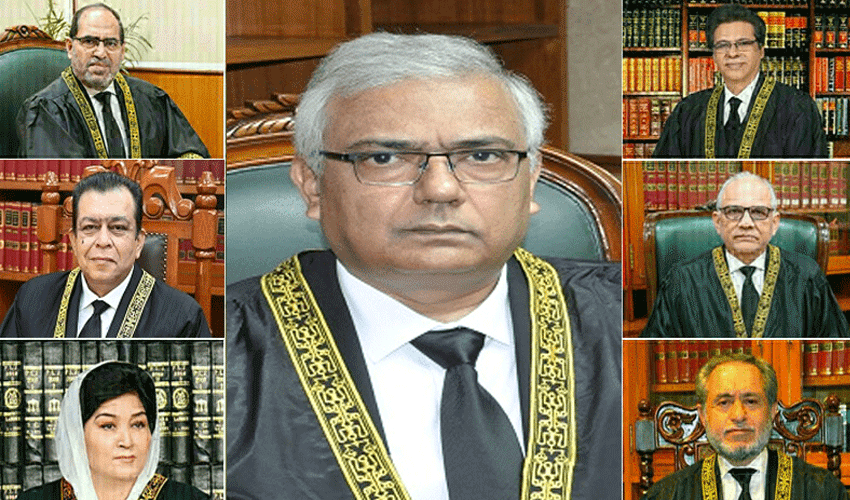The Supreme Court of Pakistan has raised key questions regarding the trial of civilians in military courts, during the ongoing hearing of intra-court appeals.
A seven-member constitutional bench, headed by Justice Aminuddin Khan, examined the validity of military courts trying civilians and questioned the need for such trials.
During the hearing, Justice Naeem Akhtar Afghan, in a thought-provoking remark, asked, "Are shopping malls built inside cantonments? If I enter by force, will I also have a military trial?"
Justice Jamal Mandokhel echoed similar concerns, stating, "If military trials are initiated for entering prohibited places, it will become very easy to conduct military trials of anyone."
The bench further delved into whether civilian trials in military courts are being pursued because of the severe punishments these courts impose. Justice Mandokhel raised the point, saying, "Do cases go to military courts due to high sentences?" He also questioned why there is no independent forum for military trials, stressing that this issue was highlighted in the past in the FB Ali case.
Lack of independent forum for military trials
One of the key issues discussed during the hearing was the absence of an independent forum for military trials. Justice Jamal Mandokhel remarked that since the inclusion of Article 10A in the Constitution, the ability to challenge military trials on the grounds of fundamental rights has been significantly limited. He pointed out that the deficiencies identified in the FB Ali case remain unresolved to this day. Justice Mandokhel asked, "Why is there no independent forum for military trials?"
The defense ministry’s lawyer, Khawaja Haris, argued that the military trial of civilians cannot be reviewed in the context of fundamental rights, emphasizing the Constitution's restrictions on military courts. However, Justice Jamal Mandokhel made it clear that this issue still requires more clarification and scrutiny.
Concerns over legal precedents
The bench also revisited earlier legal precedents, including the Muharram Ali and Liaquat Hussain cases, which have been used to justify military trials. However, Justice Mandokhel pointed out that such justifications remain problematic and require further examination. He remarked, "Since Article 10A was included in the Constitution, the previous things have ended," alluding to the modern legal framework that protects fundamental rights.
The bench also considered whether the military courts' jurisdiction could be expanded to encompass situations such as trespassing into prohibited areas. Justice Muhammad Ali Mazhar remarked that Pakistan’s military establishments, including cantonments, are not clearly defined, with some areas in Karachi and Quetta remaining ambiguous in terms of restrictions on civilian entry.
In response to concerns over the scope of military trials, Justice Mandokhel emphasized, "If military trials are started for going to prohibited places, it will be very easy to conduct a military trial of anyone." This raised the issue of whether military courts could potentially be used to punish individuals for minor infractions, which may not necessarily pose a threat to national security.
Key legal discussions
Justice Muhammad Ali Mazhar also separated the Defense of Pakistan from the defense services, clarifying that the civil defense should not be linked with the country’s defense policies. He stated that the crimes warranting military trials must be of such a nature that they directly affect the armed forces.
Justice Hassan Azhar Rizvi drew attention to the practical implications, revealing that several Supreme Court judges, including himself, reside in areas like Clifton Cantt in Karachi, where there are no clearly defined prohibited areas. This highlighted the complexity of applying military jurisdiction to civilian life.
The bench also revisited the Army Act, describing it as a valid law, but questioned its application in the context of the constitutional framework, particularly in light of Article 10A, which guarantees the protection of fundamental rights. Khawaja Haris contended that the Army Act should remain unaffected by constitutional guarantees, stating that it is a valid law governing military matters.
The hearing was adjourned until April 15, 2025, when Khawaja Haris will continue presenting arguments regarding the scope and validity of military trials for civilians. The case will likely have significant implications for Pakistan's legal system and the balance between national security and individual rights.


























